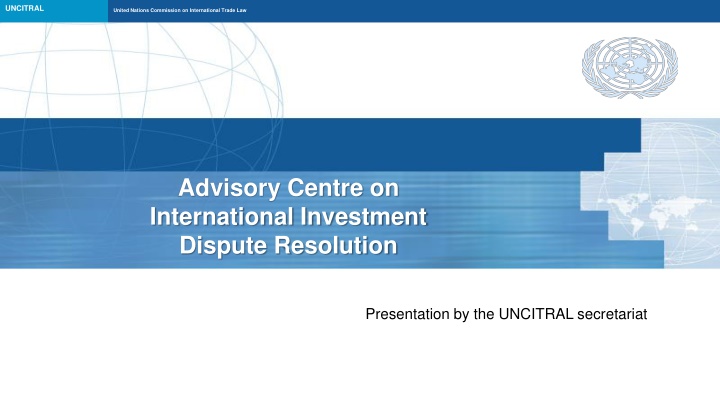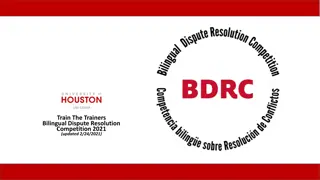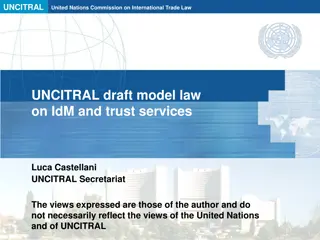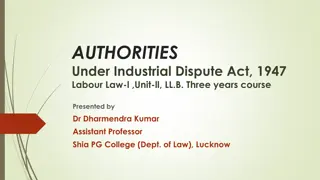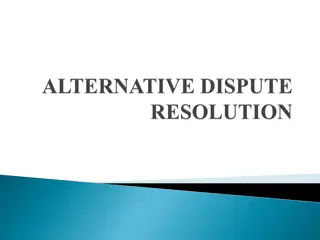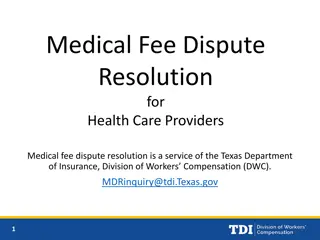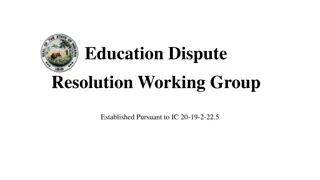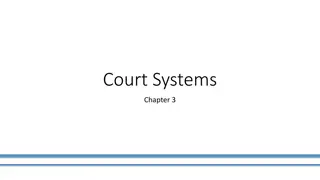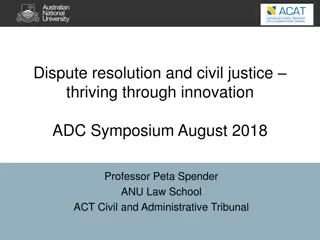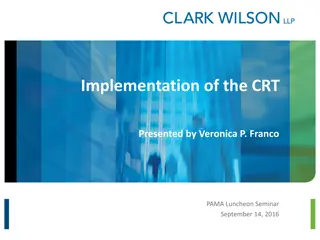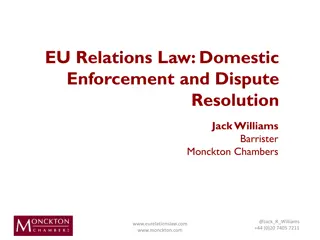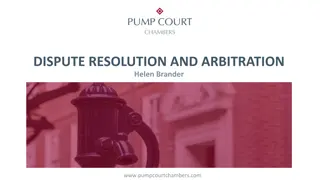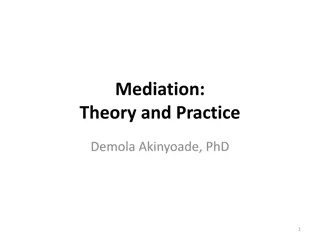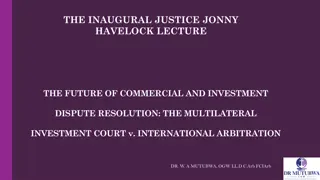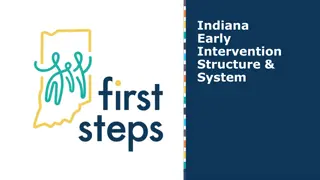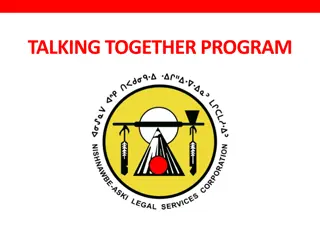International Investment Dispute Resolution Advisory Centre by UNCITRAL
The UNCITRAL Advisory Centre on International Investment Dispute Resolution aims to address the increasing number of investment disputes faced by countries, particularly developing and least developed nations. The Centre provides technical assistance, legal advice, and capacity-building to help these countries effectively navigate complex issues in international investment law. With a focus on ensuring access to justice, the Centre also offers representation services and membership opportunities for countries categorized based on specific criteria. Hosting of the Centre and financing details are also outlined in the presentation.
Download Presentation

Please find below an Image/Link to download the presentation.
The content on the website is provided AS IS for your information and personal use only. It may not be sold, licensed, or shared on other websites without obtaining consent from the author.If you encounter any issues during the download, it is possible that the publisher has removed the file from their server.
You are allowed to download the files provided on this website for personal or commercial use, subject to the condition that they are used lawfully. All files are the property of their respective owners.
The content on the website is provided AS IS for your information and personal use only. It may not be sold, licensed, or shared on other websites without obtaining consent from the author.
E N D
Presentation Transcript
UNCITRAL United Nations Commission on International Trade Law Advisory Centre on International Investment Dispute Resolution Presentation by the UNCITRAL secretariat
Why an Advisory Centre? Increasing number of investment disputes: Commission Over 130 countries (of which some 80 developing countries, including 18 least developed) have so far faced treaty-based international investment disputes (74 new disputes in 2021 alone)). The number is much higher if based on investment contracts and national investment laws are considered. The international investment law and policy regime is one of the strongest international regimes in existence and it is quite likely that the number of disputes will grow further. High costs and long duration of ISDS proceedings: ISDS cases involve high costs for respondent States and raise concerns about the use of public funds. Lack of financial and human resources including experience/capacity: Many developing and least developed countries do not have sufficient financial resources and human capacity to deal effectively with highly complex issues of international investment law. They often face difficulties obtaining quality legal representation to help with the defence. Strategic reform element for: Addressing identified concerns, including costs of ISDS proceedings, correctness and consistency of decisions and access to justice for LDCs and developing countries, and restoring legitimacy of ISDS system. ACWL as a possible model. UNCITRAL United Nations Commission on International Trade Law
Some key elements Services to be provided: Technical assistance and capacity-building including training, seminars, exchange forum, etc. Legal advice and support with regard to international investment dispute proceedings including representation services at all phases of the proceeding Focus on LDCs and developing countries Services open to all countries Membership: Categorisation of countries into three categories (Annexes I, II, III) impacting priority access to services, fees and contributions All LDCs in Annex I, with objective criteria to be further determined for populating Annexes II and III Hosting of the Centre: Expression of interests from Armenia, France, Ghana, Paraguay and Thailand to host the Centre or a regional office thereof. Further expressions of interests expected, in particular from other developing countries and LDCs (list not closed) UNCITRAL United Nations Commission on International Trade Law
Financing and provisional budget estimated figures Around USD 5.3 million estimated for the initial funding of the Centre including its establishment and operation in the first year After the first year, USD 4.87 million of annual budget estimated (headquarters) or USD 5.19 million (including one regional office) No regular budget implication if the Centre is established as part of the UN system (entirely extrabudgetary resources) Minimum contributions of Members listed in Annexes I, II and III to be on a sliding scale with that of Members listed in Annex III being the highest UNCITRAL United Nations Commission on International Trade Law
Draft statute of the advisory centre (A/CN.9/1184) overview Financing Establishment Art. 8 Art. 1 Legal status and liability Objectives Art. 9 Art. 2 Reservations Art. 10 General principles Art. 3 Depositary Art. 11 Membership Signature, ratification, acceptance, approval, accession Art. 4 Art. 12 Structure Entry into force Art. 5 Art. 13 Technical assistance and capacity- building Annexes Art. 6 Art. 14 Amendments to the Protocol and Legal advice and support with regard to international investment dispute proceedings Art. 15 Annexes Art. 7 Withdrawal and termination + Annexes Art. 16 UNCITRAL United Nations Commission on International Trade Law
Future preparatory work on the operationalization of the advisory centre (A/CN.9/1184, draft statute of an advisory centre presented to the Commission) Expected issues to be addressed by the preparatory work: Ways to establish the advisory centre within the United Nations system based entirely on extrabudgetary resources Criteria to determine the location of the headquarters and regional offices Anticipated budget based on membership and the workload and the need to ensure sustainable operation Amount of contributions by members of the advisory centre and methods of payment Objective criteria to classify potential members in Annexes I to III Thresholds of membership and contributions for the entry into force of the statute Decisions, rules and regulations to be adopted by the Governing Committee, including staff and financial regulations Any other issues UNCITRAL United Nations Commission on International Trade Law
Future preparatory work on the operationalization of the advisory centre (A/CN.9/1184, draft statute of an advisory centre presented to the Commission) Expected features of the preparatory work: Informal process involving States and regional economic integration organizations interested in becoming a member of the advisory centre Transparency and inclusiveness of the process by making the summary of the informal discussions available and possibly involving other observers of Working Group III Informal process could be led by the bureau of the Commission and/or of Working Group III and would report back, as appropriate, to the Commission with recommendations Informal meeting in Bangkok tentatively from 2 to 4 December 2024 Additional informal meetings, including virtually and at the margins of Working Group III sessions in 2024 and 2025 Possibility to request the secretariat to provide support for the preparatory work and the informal process UNCITRAL United Nations Commission on International Trade Law
UNCITRAL United Nations Commission on International Trade Law Thank you for your attention! Further information: http://uncitral.un.org/
